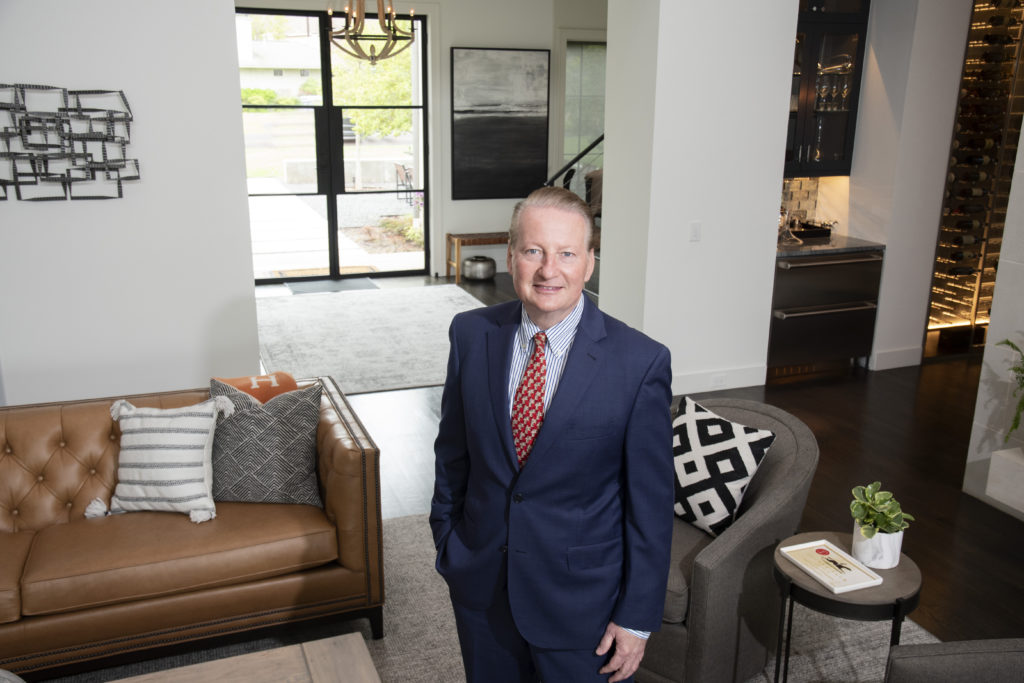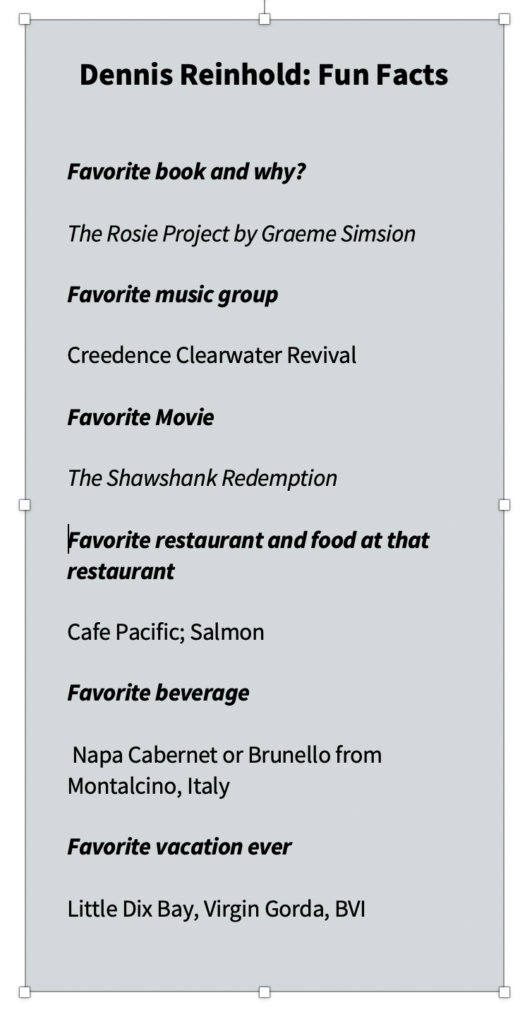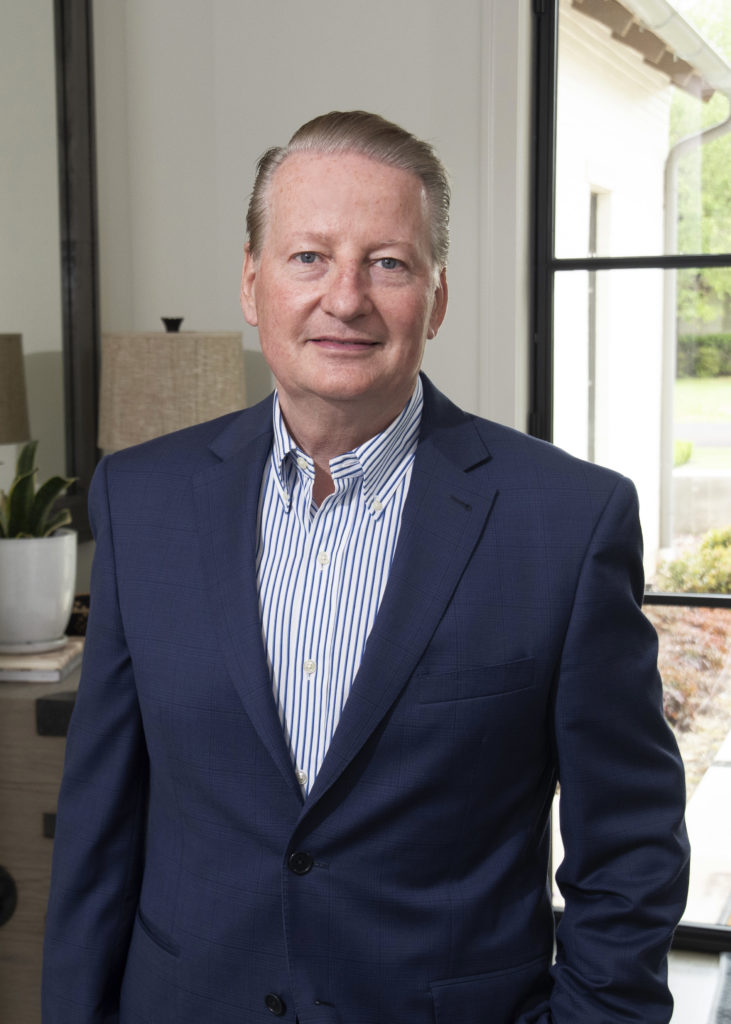
Dennis Reinhold had just received his doctor of jurisprudencefrom Saint Louis University School of Law in 1986 when his father walked up to his son with tears in his eyes.
“This was very unusual, as he was a strong, serious person of German descent, and I had only seen him cry once before, when his mother had died,” Reinhold said. “I asked him what was wrong. He was so incredibly proud of me, and then he shared this amazing revelation.”
The elder Mr. Reinhold wanted to be a lawyer as a boy, but he had been drafted to serve in the Korean War right after high school and then got married. He put his family first and needed to provide for them, so he gave up on the idea of ever going to college or law school.
“He never had told anyone that he wanted to be a lawyer,” Reinhold told The Texas Lawbook. “Watching me walk off the stage was like watching his lifelong dream come to fruition through his son. That’s why there were tears in his eyes.”
Reinhold is now 60, but his father, who died three years ago, would be just as proud of his son today.
For 15 years, Reinhold was the general counsel of Aventiv Technologies and its subsidiary, Securus Technologies and has led more than 20 M&A transactions that transformed the business into the premier prison and jail communications and technology company, which has quintupled in size.
But in 2020, he played a critical role in allowing tens of thousands of families across the U.S. have much needed electronic or remote contact with their incarcerated relatives who were isolated from any outside public in-person contact for several months due to the Covid-19 pandemic. In addition, he helped pioneer a program that reduces recidivism and crime.
The Association of Corporate Counsel’s DFW Chapter and The Texas Lawbook have named Reinhold a finalist in the 2020 DFW Outstanding General Counsel of the Year Award for a Midsized Legal Department. The award ceremony is being held on June 3 at the George W. Bush Institute.

“Dennis Reinhold helped spearhead an effort by Securus to ensure that inmates were connected to what matters – family, no matter how upside down the world became,” said Bell Nunnally partner Randall Lindley, who nominated Reinhold for the award. “Dennis helped steer Securus through an extraordinarily challenging year, ensuring the company operated with users of its services and the families who rely on them.”
Lindley said that Reinhold’s leadership in the “little-heralded but critically important program [that] has served as a communications lifeline for incarcerated individuals and has been a stimulus program for their morale.”
Reinhold said Aventiv is laser focused on safety and security and works closely with law enforcement personnel on software and other solutions that help solve crimes and that prevent crimes from occurring.
At the same time, he said the company provided inmates and their families with millions of hours of free phone calls, free video connections and free emails when correctional facilities eliminated in-person visitation because of Covid-19.
“We are very focused on social responsibility and on improving the lives of often forgotten or overlooked incarcerated individuals, while at the same time preventing criminal activity, both inside and outside of jails and prisons,” Reinhold said. “Every day we’re trying to find ways to make our products and services more accessible and more affordable, in order to improve communications between incarcerated individuals and their friends and family, reduce recidivism and help with post-incarceration life.”
Reinhold was born in Red Bud, Illinois, which is just southeast of St. Louis. His grandfather was a cattle farmer. He, his siblings and cousins worked on the farm on weekends and throughout most summers.
After serving in the Korean War, Reinhold’s father spent most of his career as an engineer at the Union Electric Company in St. Louis.
“My dad was a serious and disciplined man,” he said. “He was smart – he loved to read and do New York Times crossword puzzles. He was stubborn – never shied away from a good debate. He was resourceful – he could fix anything.”
Reinhold said his parents were married for more than 63 years.
“My mom is very kind, caring and giving,” he said. “She is nearly blind, and almost completely deaf, but she still has a great attitude.”
His mother is now 87 and still lives in the same house where she raised her children.
“Dad had instilled in me a strong work ethic,” said Reinhold, whose first job was at Kentucky Fried Chicken. “I worked hard, first to buy my own car at age 16 but then to save money for college.”
At age 17, KFC promoted him to assistant manager.
There were no lawyers in the Reinhold family. In fact, he was the first to attend college.
“The first time that I recall that I wanted to become a lawyer was in third grade,” he said. “Sounds strange, but that’s all I ever wanted to be. Maybe it was divine intervention because of my father’s desire to be a lawyer.”
After obtaining his bachelor’s degree in business administration from the University of Illinois Urbana-Champaign, Reinhold earned his law degree in 1986.
For four years, Reinhold was a corporate transactions associate at Michael Caolo and Associates, which is the firm now known as Bell Nunnally. The firm had only five lawyers at the time.
“I chose it over the larger, more well-known firms [because] from Day One, I was involved in sophisticated transactional work and regularly attended meetings with marquee clients,” he said. “I remember being the lead on a transaction as a second-year lawyer. Two of my friends who were also second year lawyers and were working at one of the large old-school firms in Dallas were on the other side of the table with two or three partners. Their sole jobs were to take notes, get coffee and under no circumstances were they allowed to talk or voice their opinion.”
SnyderGeneral Corporation was the firm’s largest client at the time, and Reinhold did a lot of the corporate work for them. CEO Richard Snyder wanted to start his own in-house legal department and offered the job to Reinhold.
“I wanted to be more involved in business-related issues, not just pure legal issues, so that was very appealing to me,” he said.
The year 2005 was a big one for Reinhold.
First, he opened Campania Pizza, the first genuine Neapolitan pizzeria in Dallas in the West Village and a second restaurant in Southlake Town Square in 2008.

“The use of drones to smuggle drugs, weapons and cell phones into prisons is becoming more common as drones become less expensive.”
— Dennis Reinhold
“I missed having genuine authentic Neapolitan pizza every time I’d come back from a trip to Italy,” he said. “I saw a need, I followed through and accomplished my goal. I got out of the business in 2016, because it became too much trouble juggling two restaurants and my day job.”
Lindley, who was an initial investor in the pizza restaurant, said Reinhold loved eating the pizza when they visited Italy.
“On the way home, Dennis said that we have to figure out a way to bring this pizza to Dallas,” Lindley said. “Many people say that kind of thing, but Dennis made it happen.”
Second, during the summer of 2005, a legal recruiter asked Reinhold to interview for the general counsel position at Aventiv, which had been without an in-house counsel for six months. He declined but she kept asking.
“I finally and reluctantly agreed to a one-hour interview, which turned into seven hours with the CEO, VP of HR and with each and every executive at the company,” he said. “As I was heading to my car in the parking lot, the VP of HR ran after me asked if I could come back up to talk to the CEO for another five minutes.”
Reinhold agreed. The CEO offered him the job, which he accepted 24 hours later.
Over the past 15 years, Reinhold played a significant role in transforming the company from a telecommunications company to a technology company.
“When I started in 2005, the company had a fairly narrow focus and was somewhat stagnant,” he said. “Through a tremendous amount of hard work, innovations and acquisitions, we successfully transformed the company into a dynamic, growing technology company.”
In 2005, the company employed a little over 300 people. Today, that number is more than 1,800. The company now does business in all 50 states and has contracts with thousands of governmental agencies.
Much of Aventiv’s growth was organic, but Reinhold also led the company in more than 20 technology related acquisitions.
But it was Aventiv’s hugely successful patent program that highlighted Reinhold’s career at the company.
“In 2005, I started and managed a patent innovation program that financially rewards employees whose ideas or inventions were patented – each such employee gets $1,000 and a patent plaque upon issuance of a patent,” he said. “Through these efforts, we grew the patent portfolio at Securus from 35 patents in 2005 to more than 300 patents and another 100 patents pending.”
Reinhold is the sole inventor on U.S. Patent No. 7,494,061 and the co-inventor on U.S Patent No. 10,866,597.
To save you from looking it up with the U.S. Patent and Trademark Office, ‘061 is entitled, “Systems and Methods for Identity Verification Using Continuous Biometric Monitoring.” This technology determines the identity of a party to a telephone call by continuously monitoring various biometric features of that party while the telephone call is in progress (which may include voice prints, a fingerprint scanner, a retinal scanner, etc.), including biometric sensors built into a telephone handset.
Through the use of this technology and related technologies, the company, with participation from law enforcement, stopped a hit on a judge, helped break up a child sex trafficking ring, helped to eradicate a drug smuggling ring that was smuggling drugs into a prison, helped recover kidnapped victims and helped solve numerous crimes,” he said.
Patent ‘597 is entitled “Drone Detection and Interception.”
“Drones are a huge security issue in jails and prisons and could potentially be used by terrorists to drop bombs into sporting events or large gatherings,” he said. “The use of drones to smuggle drugs, weapons and cell phones into prisons is becoming more common as drones become less expensive.”
The invention known as Patent ‘597 “contemplates various drone detection methodologies, such as thermal detection, audio detection, video detection, radar detection and radio frequency detection.”
As GC, Reinhold was very aggressive in pursuing violators of its patents.
“While imitation is the sincerest form of flattery, copying is theft – and Dennis, by leading an aggressive patent enforcement team, ensures that Securus is compensated when its technology is appropriated by competitors,” Lindley said.
In fact, Reinhold said that there were years when the legal department was actually a profit center for the company through its patent enforcement efforts.
Reinhold left Aventiv in January to become interim general counsel at Virgin Hyperloop, a private company whose investors include Virgin Atlantic’s Richard Branson. The company’s mission is to transport people or cargo at near the speed of airplanes using components such as vacuum, propulsion, tube and sled.
“At this point in my life, my focus is on fun, very cool, state-of-the-art technologies,” he said.
But Reinhold said he is proud of the good that he and Aventiv accomplished during the past year and the Covid-19 pandemic.
Last year, Securus provided 32.8 million free call credits for incarcerated individuals and their families, which resulted in 260 million free minutes of phone time. The company also provided 5.7 million free video connections to friends and families of incarcerated individuals, 18.2 million free JPay Stamps for electronic messaging, 196,919 free monthly subscriptions to Newsstand and 682,031 free game downloads.
In declaring Reinhold a finalist, the judges also pointed to his involvement with the Prison Entrepreneurship Program, a nonprofit organization that seeks to reduce recidivism and increase economic opportunity for incarcerated individuals through entrepreneurship training and reentry services.
Graduates of the two-year PEP number total nearly 2,000 and job placement upon completion is nearly 100%. The national recidivism rate ranges from 50-70%. For PEP graduates it is around 4%.
“We’re trying to help incarcerated men and women get jobs and access to social services before they get out to stop the incarceration cycle, provide a sense of purpose and to ultimately give them a fighting chance,” Reinhold said.
